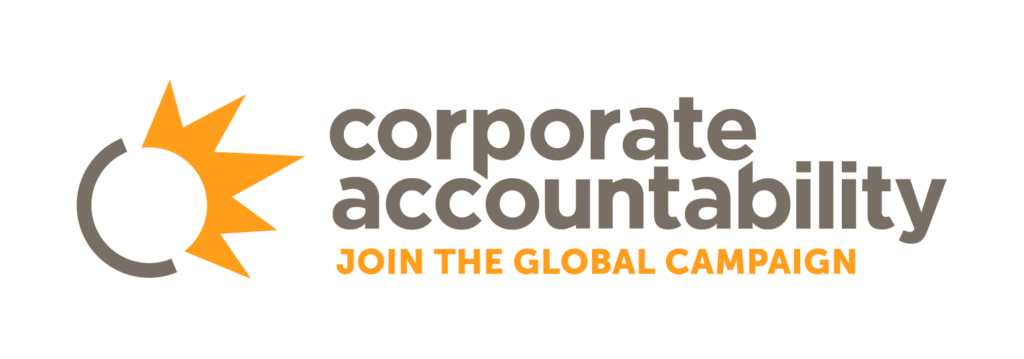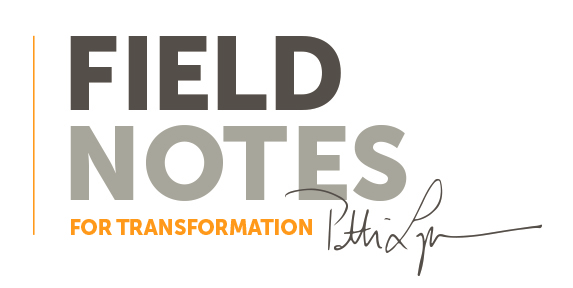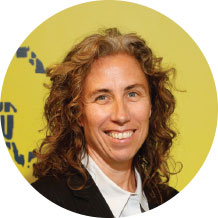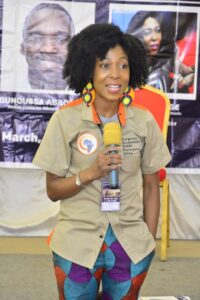

Unflinching Courage: A conversation with Nigerian organizer Aderonke Ige
Dear friend,
In these often painful and turbulent times, I find myself leaning even further into relationship with organizers, partners, dreamers, and visionaries. As we face existential questions together and confront long-standing systems of power rigged to benefit the few, I believe there is potential for huge transformation. And deep, genuine human connections give us courage to stand together, take risks, challenge the status quo, cultivate vision, and act together in solidarity. There’s no better balm for me in these times than to be in action with the people who make up the Corporate Accountability community.
That was certainly the case when I sat down to talk with Aderonke “Ronke” Ige, associate director of Corporate Accountability and Public Participation Africa (CAPPA), our long-time and closest ally, based in Lagos, Nigeria. Every time I talk with Ronke it boosts my organizing spirit. I loved interviewing her as part of this ongoing project of using “Field Notes for Transformation” to lift up the voices of the people who help shape our organizing. We talked about the connections between corporate power and democracy, and much more.
I’ve worked with the team at CAPPA since the early 2000s (when they were part of Environmental Rights Action, Nigeria). I consider Akinbode Oluwafemi, CAPPA’s executive director and Corporate Accountability’s board chair, to be one of my closest co-conspirators toward justice. CAPPA and Corporate Accountability’s visions and missions are deeply aligned, and I believe our joint organizing is breaking new ground every day around what Global South-Global North partnerships can look like. My hope is that this interview offers you as much hope and inspiration as it gave me.

Onward,

Patti Lynn, Executive Director
Patti Lynn: Corporate Accountability’s deep partnerships with Global South allies really motivates me in my work. I’m curious about how you became interested in taking on corporate power.

challenging water privatization at the Alternative
World Water Forum 2022 in Dakar, Senegal
Adoronke Ige: I was born during the Nigerian military regime. I saw the role that corporations played in instituting systems of oppression. Young as I was, I saw the struggles. I saw the terror in my father’s eyes. I saw the fear adults had of talking about the government in certain ways, as well as corporations like Shell or BP. Corporations already mastered systemic oppression historically, and the government was heavily dependent on them to continue to have the kind of resources they needed to oppress the people. It was a destructive relationship that eventually would consume the people. Some things I really can’t convey…how do you talk about that kind of terror?
As a child, my mind really couldn’t figure all of this out. I just knew that I wanted to grow up to see an alternative reality. So I began to study the system. And by the time I was 15, I saw the solidarity movement against the oppressive government and all the corporations that enabled it.
The big moment that birthed the movement was when [General Sani] Abacha ordered the execution of the ‘’Ogoni Nine’’ [activists who were leading the resistance against Shell’s human rights abuses], including Ken Saro-Wiwa, the renowned activist and writer. People got really angry. I’d go to their planning meetings, and I saw how people were beginning to shed their restrictions and ask questions. It was a sharp contrast from the fear and terror that dominated our spaces when I was seven or eight. I began to see a people whose courage, organizing, and solidarity were being ignited by their shared humanity.
That movement was done in 1999 and we got our supposed “golden democracy.” It was a joyous moment. But then I came to realize that corporations still had a hold. It’s really disheartening to see governments sell us off to them.
So I knew from even my childhood that I wanted to be able to stand up to any form of injustice, any form of oppression. I saw Shell destroy our land, destroy people, livelihoods. And it did this so nonchalantly, with no form of accountability. I saw how, no matter what government was in power, for corporations it was just a matter of buying them off. That, in part, strengthened my decision to be a lawyer.

PL: Thank you for sharing this story. I was early in my organizing career when the Ogoni Nine were executed, and that had a big impact on me. Can you talk about how the legacy of the overthrow of the military regime is part of what you are doing now?
AI: Everybody was tired in the same way at the same time—and that gave birth to the movement. Labor, civil society, communities, women’s groups, and youth groups , came together as one unified factor. All these sectors put aside their differences to confront the system.
Sometimes it’s harder for labor organizers, as employees of the government—they stand the risk of losing their jobs or being victimized. But at that point, it didn’t matter anymore. People were ready to damn the consequences. And eventually we won. The people won.
Such was the model we adopted for our water campaign. The corporations have turned themselves into an enemy of the people, attempting to grab our resources. And they have enablers with huge resources. So we need to be in solidarity with all sectors, including labor. We decided to synergize with the labor union, which was also taking bold actions against injustices.
Now, [the campaign] Our Water Our Right Lagos is being escalated to the regional level and replicated across Africa. I feel gratitude to be part of it; seeing that movements can work across countries on a continent. It’s really important to see how connected our struggles are. We may not have arrived at the final destination, but we know that we have made progress and we will not give up.
Giving up is not even part of our vocabulary anymore because the work that we do is beyond us. It’s about that child who is not even able to speak just yet, who can’t make the demands we are making. It’s about that woman in the community without visibility. These are the people whose voices we amplify. No matter how far we go or how high we climb, we always ensure that our work is rooted in community.
PL: One of the things I feel like you’re speaking to a little is the intersection of the water campaign and the democracy movement. I’m thinking about the deep connection between challenging corporate power and attending to democracy.
AI: All our campaigns seem distinct and different, but they are all connected—and at the bottom of it all, there is democracy. If democracy is about human rights—about people—then people always have to be at the heart of it.
Where people don’t have access to water, or where water becomes another commodity or economic good, then our democracy becomes a lie, a mere party of the big boys: the government of the day and whichever corporate power is pulling the strings.
So cutting through all of our campaigns is unflinching courage. We are essentially fighting the same entities. These are the corporations, the industry . These are governments who enable them. These are international financial institutions whose money and influence give corporations backing to commit and sustain oppressions.
It can almost feel like we’re only these tiny people with limited resources that do not even match up to what those entities can wield. But, the thought is uniform—resistance is a must. And that is what drives our actions: People have to be at the heart of governance. The people’s rights have to prevail. Governments exist because people exist. So you must listen to the people.
A recent example is the EndSARS campaign in Nigeria [a people’s movement rising up against police and government brutality], which is a very big component of our democracy outreach.
The kind of courage that we demonstrated will sustain any kind of movement. I remember one of the days we stood arm-in-arm as some police officers approached with their guns. Nobody ran. We started to chant a song that said “If you have to kill, you have to kill us all.” It was a risk, but at the same time, it was fearlessness in the face of turbulence. We knew that if we had cowered in fear, probably everybody would have run in different directions. They would have targeted us individually, and everything that could go wrong would have gone wrong.
Corporations and their enablers use the tactic of fear. They try to silence us, to make us feel like there are dire consequences for challenging the status quo and system of oppression.
This is the reason it’s important to show courage. It might not be short-term, it might not even be mid-term, but the people will always win.
PL: I love that so much. Before we wrap up, I wanted to ask about CAPPA’s climate work. I know you are doing so much—from directly challenging Shell and other corporations, to organizing for justice in the U.N. climate treaty process, to working with communities on the frontlines of climate change. What’s one thing you are particularly excited about in your climate work?
AI: CAPPA is excited to be part of the “Make Big Polluters Pay” movement, making the liability roadmap come to life. The roadmap has well laid-out guidelines to hold polluting corporations accountable at all levels and phases—local, national, multinational levels. It’s all there. We are using this tool to stop the government from acting helpless. They cannot say, “We really don’t know what to do or how to go about it.” Our comrades across other African countries are also presenting it at every opportunity to their governments.
The liability roadmap also makes it clear that legislation is one thing and litigation is another option in holding polluting corporations liable for their age-long injustices. So as much as we’re engaging the system, we can also hold corporations like Shell, Chevron, Total, and the rest of them accountable by taking them to court.
Recently there was a particularly successful legal action instituted against Shell in the Nigerian court, where it was ruled that Shell’s headquarters can be held liable for whatever action their subsidiary commits. This is a big deal. Shell used to look like the almighty entity which no one dared challenge, but now it’s exposed and demystified. There’s no almighty here, but only make-believe: a group of environmental criminals with huge resources. So the people know now to not be terrified. Shell can’t exist without them and not the other way around. So for the people, that is a morale boost.
PL: I think that’s really the heart of the matter. Corporations like Shell create this mythology around their power. But when we’re wide awake and not intimidated, it’s people that really hold the power. Thank you for summarizing it that way.
AI: It’s so exciting when you see people get it. And there’s a renewed sense of hope in knowing there are people joining hands with them from everywhere. That too gives me a lot of hope these days.
Other issues of the Field Notes conversations series features Ashka Naik, research director, on leadership and corporate campaigning; and Carolina Santamaria, recruitment director, on building an inclusive and effective campaign organization.


